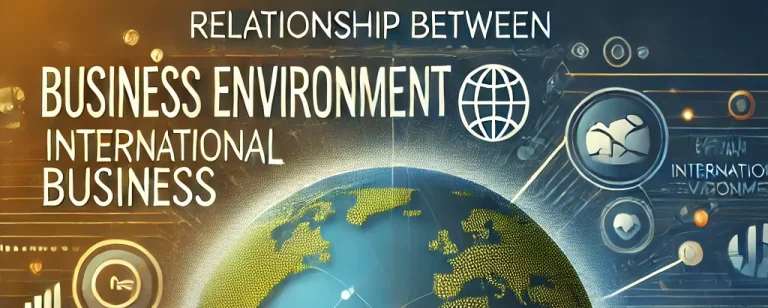The connection between the business environment and international business is a dynamic interplay of forces that shape how organizations operate across borders. Businesses today are heavily influenced by external factors such as political stability, economic trends, technological advancements, legal regulations, and cultural nuances. These factors determine the strategies businesses adopt and influence their ability to succeed in international markets. A thorough understanding of these factors allows companies to mitigate risks and seize opportunities, ensuring sustainable growth. This relationship forms the backbone of international business strategy, where adaptability and foresight become critical.
Business Environment and Its Impact on International Business
The business environment encompasses all the external and internal factors that influence an organization’s operations. For businesses entering international markets, these factors become more complex due to the diversity in legal systems, cultural expectations, economic conditions, and technological infrastructure. Understanding and analyzing these components is fundamental for businesses to thrive in foreign markets.
Economic Factors
Economic factors are perhaps the most significant components of the business environment that impact international business. Countries differ in their levels of economic development, income distribution, market size, and currency stability. These factors directly affect a company’s ability to operate and remain competitive in foreign markets. For instance, businesses targeting emerging markets may benefit from lower costs and rapidly expanding middle classes, but they must also contend with risks such as inflation and currency volatility.
For example, a company like Procter & Gamble tailors its pricing strategies based on the purchasing power of consumers in different countries. In low-income markets, it may offer smaller, affordable product packages to cater to price-sensitive customers. This approach not only boosts sales but also ensures that the brand remains competitive.
Political and Legal Environment
The political and legal environment in a host country plays a decisive role in shaping international business operations. Governments influence business through regulations, trade agreements, tariffs, and import-export controls. Companies must navigate political risks such as changes in leadership, policy shifts, or geopolitical conflicts, which can disrupt business operations. For instance, trade wars between the US and China have caused disruptions for companies reliant on global supply chains.
Legal factors such as labor laws, intellectual property rights, and tax regulations also create challenges for international businesses. For example, the European Union has stringent data protection laws under the General Data Protection Regulation (GDPR), requiring companies to overhaul their data management practices. Firms that fail to comply with such regulations face hefty fines and reputational damage.
Technological Advancements
Technological advancements have revolutionized international business by enabling companies to innovate and expand their reach. In the digital age, businesses rely on technology for marketing, supply chain management, and customer engagement. Companies like Amazon and Alibaba have transformed global trade through e-commerce platforms, which allow businesses to sell products to customers across borders with minimal barriers.
Technology also helps companies reduce operational costs and improve efficiency. Blockchain, for example, enhances transparency in global supply chains, while artificial intelligence (AI) improves customer service through predictive analytics. Countries with advanced technological infrastructure attract foreign direct investment (FDI) as businesses seek to leverage local expertise and resources.
Cultural and Social Dynamics
Culture plays an integral role in the success of international business. Understanding the cultural nuances of a target market can mean the difference between success and failure. Misinterpretations of cultural norms can lead to marketing blunders and alienate customers. For example, Pepsi’s slogan “Pepsi Brings You Back to Life” was mistranslated in China as “Pepsi Brings Your Ancestors Back from the Grave,” which created negative reactions.
Companies often adapt their products and services to align with local preferences. McDonald’s, for instance, offers vegetarian options in India to cater to cultural and religious sensitivities. Similarly, it modifies its menus in Japan and South Korea to include flavors that resonate with local tastes.

Strategic Approaches to Aligning with the Business Environment
To succeed in international markets, businesses must adopt strategic approaches that align with the prevailing business environment. These strategies often involve a thorough analysis of external factors and the development of flexible business models.
Market Research and Entry Strategies
Comprehensive market research is the first step for any business planning to expand internationally. Companies analyze target markets for consumer behavior, market demand, and competitive landscapes. This information helps businesses determine the most suitable entry strategy, whether it’s exporting, licensing, joint ventures, or establishing wholly owned subsidiaries.
For example, IKEA entered the Indian market through a hybrid strategy that included adapting its product range to meet local needs and establishing partnerships with local suppliers. The company’s decision to open large-format stores in metropolitan cities was based on extensive research on Indian shopping habits.
Localization of Products and Services
Localization involves tailoring products and marketing strategies to meet the specific needs of a target market. This strategy allows companies to build stronger connections with local consumers. For instance, Coca-Cola has successfully localized its advertising campaigns by incorporating regional languages and cultural elements, making the brand more relatable to local audiences.
Localization also extends to supply chain management. Many businesses source raw materials locally to reduce costs and support the local economy. This practice not only enhances the company’s reputation but also ensures compliance with local regulations.
Risk Management and Compliance
Operating in international markets exposes businesses to various risks, including political instability, economic fluctuations, and legal uncertainties. Companies must develop robust risk management frameworks to address these challenges. This includes purchasing insurance against political risks, diversifying supply chains to minimize disruptions, and ensuring strict adherence to legal requirements in each market.
Compliance with international trade laws and environmental standards is another critical aspect. Companies that engage in unethical practices or fail to meet regulatory requirements risk damaging their brand reputation and facing financial penalties.
Challenges in International Business Environment
International business is fraught with challenges that stem from the complexity of operating in diverse environments. Companies must anticipate and address these challenges to achieve long-term success.
Political and Economic Instability
Political instability can disrupt operations and deter investment. For example, Venezuela’s hyperinflation and political turmoil have made it nearly impossible for foreign companies to operate profitably. Similarly, currency fluctuations pose challenges for businesses engaged in cross-border transactions. A sudden devaluation of the local currency can erode profit margins and make imported goods more expensive.
Cultural Barriers
Cultural differences often create misunderstandings and conflicts in international business. Companies that fail to respect local customs and traditions risk alienating consumers and losing market share. Effective cross-cultural training for employees and hiring local talent can help bridge cultural gaps and improve business outcomes.
Regulatory Complexities
Navigating multiple regulatory frameworks is one of the most significant challenges in international business. For instance, pharmaceutical companies operating in different countries must comply with varying standards for drug approvals, packaging, and labeling. Moreover, these differences increase operational complexity and costs.
The Role of Trade Policies in Shaping International Business
Trade policies significantly influence the business environment and international business operations. Free trade agreements, tariffs, and import-export controls determine the feasibility of entering foreign markets.
Free Trade Agreements and Economic Blocs
FTAs like the North American Free Trade Agreement (NAFTA) and the European Union’s single market have facilitated cross-border trade by reducing tariffs and non-tariff barriers. Economic blocs also encourage investment by creating larger, integrated markets. Businesses that operate in such regions benefit from increased efficiency and reduced costs.
Protectionism and Its Impact
Protectionist policies, such as high tariffs and import quotas, are designed to shield domestic industries from foreign competition. However, they often create challenges for international businesses. For example, the US-China trade war led to increased tariffs on a range of products, forcing companies to adjust their supply chains and pricing strategies.
Business Environment and International Business FAQs
How has technology influenced international trade?
Technology has streamlined cross-border operations through digital platforms, blockchain, and AI, enhancing efficiency and accessibility.
How does the business environment impact international business?
The business environment impacts international business by influencing market entry strategies, pricing, and product adaptations. Political, economic, and cultural factors determine how businesses perform in foreign markets.
What are the main components of the business environment?
Key components include economic, political, social, technological, legal, and environmental factors.
Why is cultural adaptation crucial in international business?
Cultural adaptation ensures products align with consumer preferences and helps businesses build stronger connections with local markets.
What role do trade policies play in international business?
Trade policies like tariffs and FTAs determine the cost and feasibility of doing business in a particular country.


